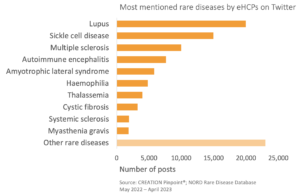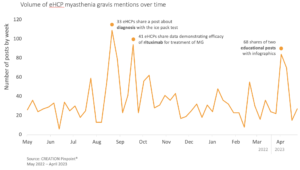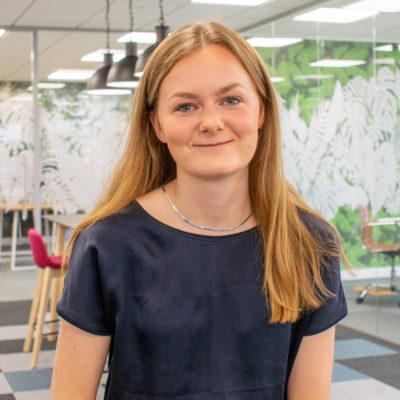There are currently over 50 million people worldwide who live with a rare disease. Social media is an especially powerful tool when patient numbers are small. Patients can find community in an otherwise isolating world, and HCPs and patient groups can work together to raise awareness and fight for new treatments. HCPs can use social media to seek and share advice.
Today is #RareDiseasesDay. Patients with #rarediseases have taught me a lot over the years. Struck by their resilience and strength in face of adversities. #FOP is an ultra-rare genetic disease. @cfopnnews @ifopa @UHNPatientExp @patientvoiceca @NORD https://t.co/V0UQqPqbNn
— Angela M. Cheung (@AngelaMCheung) March 1, 2023
We analysed the global conversation of eHCPs, using CREATION Pinpoint, our database of confirmed eHCPs curated over the last ten years. We found 92,700 eHCPs talking about rare diseases in 672,639 posts, over the last 12 months. The rare diseases that we found eHCPs discussing most are lupus, sickle cell disease and multiple sclerosis (in 19,946, 14,959 and 9,978 posts respectively). We took a closer look at what eHCPs are saying about sickle cell disease, and myasthenia gravis, a disease with current exciting new developments in treatment.

eHCPs discussing sickle cell reveal key unmet needs
We often find that healthcare professionals use online platforms to ask their peers clinical questions. This can offer useful insight to medical affairs teams, who are tasked with understanding and meeting the educational needs of HCPs.
In the sickle cell conversation, we found a nephrologist in the US asking for advice about the safety of using SGLT2 inhibitors in sickle cell nephropathy. He received replies from three other nephrologists. A pharmacist in Ghana asked for a copy of the American Pain Society sickle cell guidelines, tagging several haematologists and sickle cell specialists.
Colleagues who care for patients with #SickleCell disease, talk to me about what IV fluids you use if your patient is admitted for a pain crisis and isn’t able to maintain their hydration orally. My institution tends to use 1/2 NS. Do others do this?
— Liz Lemon, MD (@babbymd) September 16, 2022
eHCPs also take to social media to voice issues that they feel passionately about. Often, these align with the pharmaceutical industry’s commitment to patient centricity, and can provide pointers about what patient centricity should mean. For example, in the sickle cell conversation, several haematologists spoke about the need to #ListenToThePatient and take their pain scores seriously. Two paediatric haematologists expressed their exasperation at the failure to recognise the importance of early intervention in pain management.
Why do we need to keep having studies that say “the faster you treat pain, the better it is for the patient”?!? 😳😱
— Nicole Kucine, MD,MS (@PedsHemeDoc) July 2, 2022
The eHCP conversation reveals attitudes towards new treatments for rare diseases
eHCPs use their social media platforms to celebrate and raise awareness of developments in treatment. 47 eHCPs shared a post by Sekar Kathiresan who congratulated CRISPR Therapeutics and Vertex for their positive trial data for exa-cel for the treatment of sickle cell disease. An oncologist commented on the ‘very exciting’ results, noting also that there is ‘lots more to do to make somatic gene therapy accessible and safe.’
She is the first patient with sickle cell disease to get an experimental treatment that uses the revolutionary gene-editing technique known as #CRISPR. Today, all of her symptoms are gone.https://t.co/d9UYYI9iD3
— Ian Weissman, DO (@DrIanWeissman) March 17, 2023
The eHCP myasthenia gravis conversation focuses on diagnosis and treatment

eHCPs discussing myasthenia gravis see a need for greater clarity about how to diagnose the disease. They are concerned that there is an over-reliance on testing and imaging in diagnosis, and recognise particular confusion about thymomas as an associated clinical feature of myasthenia gravis. Several eHCPs shared research into the overdiagnosis of myasthenia gravis, and the implications that has on mistreating patients.
Absolutely…that's what I was explaining recently… a negative test for thymic hyperplastia or negative antibodies doesn't rule out🥺
Re: detecting non common antibodies was incredibly expensive years ago (we had a research line about a biomarker that died because of that)
— aure 🍂🌰 (@maureviv) April 18, 2023
To address these knowledge gaps among their peers, eHCPs share infographics about the signs and symptoms of myasthenia gravis, and guidance to support differentiation between myasthenia gravis and other neuromuscular diseases.
DOLs lead the rare disease conversation
At CREATION.co, we are able to identify the Digital Opinion Leaders (DOLs) in any indication. These are the eHCPs who are leading and influencing the conversation and who are trusted by their peers. Often, the DOLs are those to whom the online community is looking for advice. In the sickle cell treatment conversation, the eHCP who was mentioned by other eHCPs in the most posts about sickle cell treatment was Patrick McGann, a paediatric haematologist. In the myasthenia gravis conversation, Joshua Walinjom, a cardiologist with 69,062 followers on Twitter, emerged as a key voice.
Insight into the online conversation of healthcare professions enables pharmaceutical companies to learn about the perspectives of HCPs and the unmet needs that they are passionate about. For example, in sickle cell, we see that HCPs strongly advocate for listening to the patients’ voice, and in myasthenia gravis, HCPs fill information gaps by sharing how to diagnose the disease. It is important that pharmaceutical companies understand the differences in eHCP views, needs and behaviours within the different rare diseases.
CREATION.co has spent 25 years listening to the HCP community online and supporting pharmaceutical companies in understanding how they can work alongside these eHCPs. If you would like to know more about what eHCPs are saying about your rare disease and how you could work with them, please get in touch with the CREATION.co team.
 By Emily Fletcher-Louis
By Emily Fletcher-Louis 
